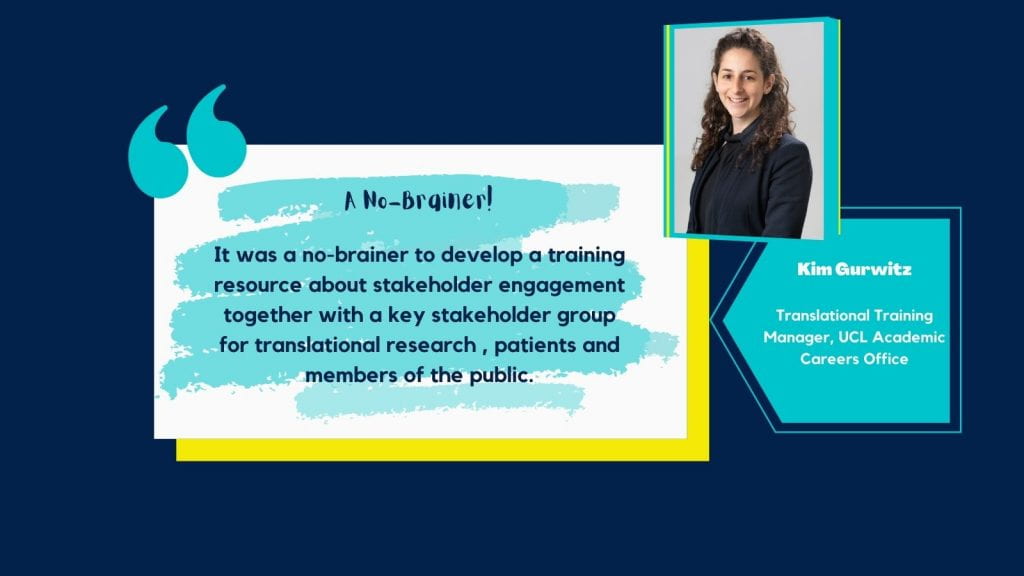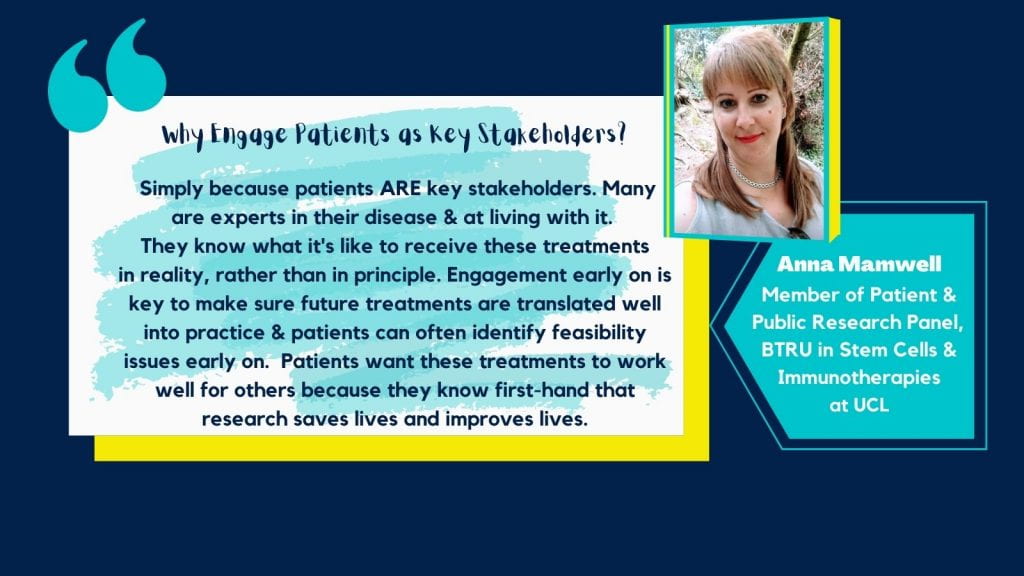Co-developing training for researchers with patient involvement
By Caroline Francis, on 14 April 2021
This blog has been written by Helen Craig, Kim Gurwitz, Linda von Neree, and Anna Mamwell. A story of co-developing a translational research training resource for researchers with patients and members of the public. In 2020/21, a year where the patient voice is especially in need of being heard, Helen and colleagues share their story of collaboratively producing a training resource.
Working together
ACCELERATE is UCL’s translational research training programme (a collaboration between the UCL Academic Careers Office and UCL Translational Research Office) offering technical training, skills development, and encouraging innovative thinking for researchers wanting to create impact with their research in healthcare. Wanting to include stakeholder engagement as a key component of ACCELERATE, Kim invited Helen, UCL Public Engagement Manager for the School of Life and Medical Sciences (SLMS), to help develop the resource, and reached out to Linda, who leads the voluntary patient and public researcher panel at the UCL Blood and Transplant Research Unit (BTRU). The team was complete when Anna and other members of the patient and public panel came on board. It is an example of why working in a networked way, and forging links with patients early on, is so important for stakeholder input.
The team then set out with the objective of highlighting why stakeholders engage with research. The starting point was a document drawn up some years previously by UCL’s Public Engagement team after talking with researchers and members of the public about why they engaged. The team, together with Anna and other panel members, began adding and tweaking. It rapidly became apparent that the original was out of date and lacked current thinking and procedures. It proved to Helen that training should never be ‘static’ but always open to new inputs and fresh perspectives.
Through working together, the document has developed and evolved, and all gained new insights. Enrichments due to patient and public input were many, but major changes included:
- A much stronger emphasis on how incorporating patient and public engagement ultimately leads to better, more relevant, and appropriate research.
- More from the patient perspective – the previous resource hadn’t captured the empowerment that can be felt by being involved in research. It gives a ‘voice’ to powerful personal experience; it contributes authenticity to research protocols. There are strong altruistic drivers that lead to patients sharing their experience, skills, and knowledge.
- More awareness of tone when writing and how this may influence readership and deflate the spirit. Jargon, hackneyed use of overworked phrases or flippancy, such as, ‘engagement is fun!’ do not inspire or involve. It is important to be thoughtful about language and the impact it may have on those who read it.
The final training resource
The ACCELERATE stakeholder engagement training resource now highlights the many benefits of engagement for researchers, patients, carers, and members of the public. Its development has been an outstanding example of how much is gained by reaching out and including the perspectives of all stakeholders.
The resource highlights different motivations and drivers for engaging in translational research from the viewpoint of researchers, ethics, research quality, industry, and legal considerations, and now including patient stakeholders.
For the full resource, you can check out the ACCELERATE webpage for ‘Involving patients and the public in research’.
The importance of building relationships, especially for translational research
In lab-based and early translational research, involving patients, carers, and members of the public is not yet standard and can be viewed as challenging. But the aim of medical research is to address unmet needs and health issues in our society at large – so patients and public groups are key stakeholders. However brilliant research ideas may seem in a vacuum, complementing them with the perspectives of patients, carers, and the public makes them more relevant.
Including various perspectives often starts with building relationships and having conversations. The first step is reaching out to those whose perspectives you wish to learn about. This connection in itself can be the aim for involvement in preclinical research as you learn from perspectives and questions that you may have never previously considered and gain valuable insights into current work and development for clinical practice.
It’s not difficult if you work one step at a time. Many patients are interested to hear about ongoing research for their condition and to get involved in it. Patient and public involvement in research is all about relationship building and mutual learning, so why wouldn’t you chat about your research and learn about the perspectives of patients and members of the public on it in the future?
Engaging early on with the target audience can have many benefits as well as save you time and money in the future. It’s about a small investment of time that accrues a beneficial long term reward.
Hear Anna’s perspective – Why stakeholder engagement matters even in early translational research and what patients bring to the table!
Why patients want you to engage:
As patients, we bring first-hand, lived experience of conditions that translational research strives to tackle, in my case blood cancer (Acute Myeloid Leukaemia). I have a unique perspective that cannot be learnt or taught and because of my patient advocacy work, I’m also able to add valuable insights on behalf of others in a similar position. We are experts in what it’s actually like to live with a condition and receive treatments, therefore, we can highlight problem areas and suggest ways of mitigating them which may not have been considered.
Translational research aims to save lives, prolong lives, and improve quality of life which is something patients who get involved are passionate about because of their experiences. They fully understand how important research is and have no agenda other than the desire to give honest, constructive, and trustworthy feedback as well as help disseminate information. Patients and public members bring many useful links in addition to their own valuable skills from their professional backgrounds.
So why are patients only seen as a ‘statistic’ or ‘problem to solve or treat’? Patients actually possess a wealth of knowledge and need to be acknowledged as valuable partners. Having us involved in research helps to give reassurance to patients who may be considering taking part in a clinical trial and to highlight catch possible issues or concerns early. What are you waiting for?! 🙂
Main take-home point and next steps
In essence, patient and public involvement in research is all about building relationships and mutual learning. It starts with a conversation, which drives learning and new insights leading to the multiple benefits highlighted in the ACCELERATE stakeholder engagement training resource. Just like us, you’ll find that training, research, and future treatments can only be improved through involving people who are ultimately to benefit from it.
Explore the below opportunities for engaging and involving patients and the public in your research:
- ACCELERATE translational training programme, check out the ‘ACCELERATE Expertise’ resources on involving patients and the public in translational research and the general ACCELERATE webpages for all ACCELERATE initiatives.
- UCLH BRC PPI training, sign up for regular workshops for researchers on patient and public involvement (PPI) in research.
- UCL Public Engagement, training programme.
- Community of Engagers, sign up for the mailing list by emailing the UCL Public Engagement team.
- A practical guide to patient and public involvement in lab-based research developed by UCLH BRC, Alzheimer’s Society and Parkinson’s UK, in partnership with patients and researchers.
 Close
Close







